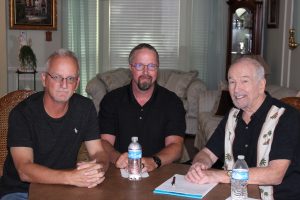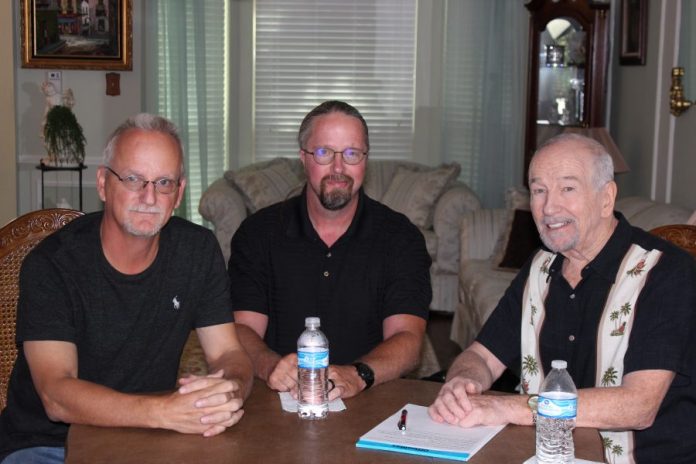
Sometimes, being a Christian means struggling against one’s primordial instincts in order to subscribe to the teachings of the Bible. “Thou shalt not kill” is one of the Ten Commandments, yet, we take human lives in war and in furtherance of penalties prescribed by law. The Scriptures tell us that we must forgive those who trespass against us, but, it doesn’t say how severe the trespasses may be that we’re required to forgive. We have laws that penalize those who break them because we’d be uncivilized if there were no restraints on the conduct of imperfect people. When someone commits a crime against a person or property, the laws of the state are responsible for the arrest and prosecution of the criminal.
The victim of the crime, or in the case of homicide, the relatives of the victim, look to the state to mete out the appropriate penalties. We may have a strong desire to punish the offender ourselves, but, in the interests of an organized society, we hand that job over to the arbiters of justice. But, what happens when the crime is so brutal, so heinous, that it unleashes the primal scream kept hidden deep inside the human animal? Can there be any forgiveness for, or compassion toward, the savage behavior that had no such sympathy for the helpless victim? That’s a question asked by many victims who have been faced with personal tragedy and felt the urgency for revenge.
Tac Buchanan is the regional coordinator for Bridges to Life (www.bridgestolife.org), a rehabilitative program in many Texas prisons and in eight other states and three countries. There was a time in which Mr. Buchanan would have been the last person to embrace this job. Fifteen years ago, to think that he’d be the one leading a prison program of counseling with violent criminals, after his wife was murdered, would be preposterous. “I still wake up and can’t believe what I’m doing,” he said. “But I think I’ve got the best job in the world.”
Mr. Buchanan’s tragic experience is being made into a movie entitled, “The Redemption Clause.” In the video interviews, producer, director Roger Lindley talks about the making of the faith-based movie which describes Buchanan’s transition to forgiveness through the teachings of the Christian religion. More on Roger Lindley’s films can be found here: www.imdb.com/name/nm1407158/
The following info for this story was sent by staff at Bridges to Life:
“No life has changed as much as Buchanan’s. His wife, Ronnie “Kitten” Hewitt, was murdered in 1998 at an apartment at 1216 W. 11th Ave. in Amarillo, Texas. Tony Roach, a drifter from South Carolina, broke into the apartment and watched Hewitt for 15 minutes as she showered and dressed. As she walked down a hallway, Roach attacked her. He raped her, strangled her with a belt, then set the apartment on fire. Her husband was consumed by rage, overwhelmed with revenge, especially after his young daughter was taken away by the courts. Buchanan thought he had lost everything in the world that mattered. He medicated his pain with drugs, and soon landed in Potter County Jail on a felony drug-possession charge.
“That was fine with him. That’s where Roach was, and Buchanan would kill him there. But when word got around that the husband of the wife Roach murdered also was there, Buchanan was transferred to Randall County. Eventually, Buchanan found himself in 2002 in a substance-abuse felony punishment facility in Breckenridge. One of the requirements is to write an autobiography, and Buchanan wrote and wrote and wrote. He ended it this way: ‘They have given Roach the death sentence, and after the state kills him, five minutes later I want to be dead so I can go to hell and spend eternity killing him over and over.’
“An alarmed staff had Buchanan take a psychological test, and eventually he saw the facility’s chaplain. Buchanan told the chaplain his story, which had the chaplain in tears. He suggested Buchanan go to a worship service, a new thing for him. That began a journey for Buchanan, one that led him to faith in Christ, and a much harder road, a path toward forgiveness for Roach. ‘I just prayed to God to give me the strength to forgive Tony Roach because I can’t do it on my own.’ He finally reached that point.
“For three years, Buchanan said, he had been walking in forgiveness for Roach. Then, in 2007, Roach was to be executed, and Buchanan was asked to attend as a witness. At one time, he would have given anything to put the lethal injection in Roach’s veins, but now he wasn’t so sure. He took out his Bible, and several verses spoke to him. He decided to go to Huntsville, taking daughter Nakita, and went in a spirit of forgiveness. What Buchanan did not know was that Roach was a changed man, too. He keeps a copy of Roach’s final words. It is a long statement, but not rambling. It’s pointed and heartfelt. Roach spoke of God, and his grace in saving his miserable life, and helping him to forgive himself.
“He said not a day had gone by that he had not prayed for Ronnie Dawn Hewitt and her family. He spoke to Buchanan, saying he had prayed that God would take away the bitterness in his life like God had in his own. ‘He said that I have prayed that someday you will find forgiveness in your heart,’ Buchanan said. ‘He said, ‘I’m so sorry for what I did. Can you forgive me?’ Buchanan, who already had, nodded his head. ‘Then he said he was ready,’ Buchanan said, ‘and I watched him die and go to heaven.’”
“Buchanan returned to Amarillo, where he worked a couple of jobs, building fences and working for a sign company. Some years later, he was working in an outreach program for Trinity Fellowship Church. A friend’s son, who recently had been released from prison, asked to talk to him. He spoke of the Bridges to Life program he had taken in a downstate prison. ‘He said that he finally saw things from the victim’s standpoint and never wanted to hurt anyone again,’ Buchanan said. He Googled the program, thought it was what he wanted to do with his life, and it was not long before he was talking with founder John Sage in Houston. Soon, Buchanan was in the Clements Unit. It’s seamless now, an extension of his new life to spend time with inmates and victims. Buchanan was once in a dark place, but through forgiveness, he climbed out to help others do the same.”







.jpg)






